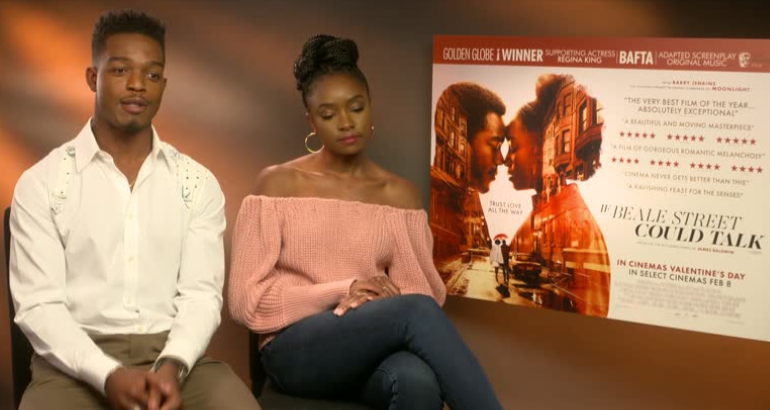If Beale Street Could Talk: A Poetic Ode to Love and Injustice

- Film





Overview
Barry Jenkins' If Beale Street Could Talk (2018) is a lyrical adaptation of James Baldwin's 1974 novel, weaving a tender love story with a searing indictment of systemic racism. Set in 1970s Harlem, the film follows young couple Fonny (Stephan James) and Tish (KiKi Layne) whose lives are shattered when Fonny is falsely accused of rape. With its lush cinematography, soulful score, and profound emotional depth, the film stands as both a celebration of Black love and an unflinching portrait of America's justice system.
The film received widespread critical acclaim, earning three Academy Award nominations (including Best Adapted Screenplay for Jenkins) and winning Best Supporting Actress for Regina King's powerful performance. Its intimate storytelling and visual poetry cement it as a worthy follow-up to Jenkins' Moonlight.
Contents
The Direction: Jenkins' Visual Poetry
The Performances: Quietly Devastating
Historical and Contemporary Relevance
The Story: Love Interrupted
The narrative unfolds through Tish's recollections, shifting between the couple's idyllic early romance and the grim present where Fonny sits in jail. As Tish discovers she's pregnant, her family (led by Regina King's fierce yet vulnerable Sharon) rallies to prove Fonny's innocence, confronting a legal system designed to fail them.
Key sequences—like Fonny and Tish's first intimate moment in their unfinished apartment, bathed in golden light—contrast with the cold blues of prison visiting rooms. The film's most devastating moment comes when Sharon travels to Puerto Rico to confront the alleged victim, a scene that lays bare the interconnected oppression of Black and Puerto Rican communities.
The Direction: Jenkins' Visual Poetry
Jenkins and cinematographer James Laxton create a sumptuous visual language. The camera lingers on faces in extreme close-ups, recalling Baldwin's insistence on the power of truly seeing one another. Harlem becomes a character itself, filmed with the romanticism of a memory.
The use of color is particularly striking—warm ambers for love scenes, sickly greens for institutional spaces. Nicholas Britell's score, blending jazz and classical motifs, adds another layer of emotional texture. Jenkins' signature "double dolly" shots (used sparingly here) lend moments of levitation-like transcendence.
The Performances: Quietly Devastating
KiKi Layne's breakout performance as Tish carries the film's quiet strength. Her voiceovers (directly quoting Baldwin) feel less like narration than shared confidences. Stephan James brings coiled intensity to Fonny, particularly in a jail scene where his rage dissolves into helpless tears.
Regina King's Oscar-winning turn as Sharon is a masterclass in restraint. Watch how her face changes when a white store clerk ignores her—microexpressions conveying generations of practiced composure. Colman Domingo and Brian Tyree Henry (in a blistering one-scene cameo) add further depth to Baldwin's richly drawn Harlem community.
Themes: Love as Resistance
At its core, the film argues that Black love is itself an act of defiance in a world bent on destroying it. The title refers to Baldwin's notion of Beale Street as a symbol of Black experience everywhere: "Every Black person born in America was born on Beale Street...whether in Jackson, Mississippi, or in Harlem, New York."
The justice system's cruelty is portrayed not through graphic violence but bureaucratic indifference—a public defender sighing, a landlord's racist assumptions. Even Fonny's white friend (Finn Wittrock) embodies liberal complicity, his "help" ultimately useless.
Historical and Contemporary Relevance
While set in the 70s, the film's themes resonate painfully today. The Central Park Five connection (Baldwin reportedly based Fonny on their case) and the film's release during the Trump era make its commentary on wrongful incarceration tragically timeless.
Jenkins adds subtle updates, like having Tish work at a perfume counter—a nod to modern retail racism incidents. The ending, more ambiguous than Baldwin's, reflects ongoing struggles rather than tidy resolution.
Critical Reception and Legacy
Critics praised the film's "liquid beauty" (Vanity Fair) and emotional power, though some found its pacing too deliberate. It underperformed commercially, a reminder that Black stories not centered on trauma often struggle for attention.
Yet its influence grows steadily—seen in how films like Passing and The Underground Railroad now embrace Baldwin's literary richness. The Criterion Collection release ensures its place in the canon.
Why You Should Watch It
If Beale Street Could Talk is essential viewing for anyone who believes cinema can be both politically urgent and achingly romantic. It's a film to savor—for the way sunlight filters through a bridal veil, for the ache in Fonny's whispered "Hold on," for the radical hope of its final image. In Jenkins' hands, Baldwin's words become a hymn to what love can endure, and what it demands we fight for.







